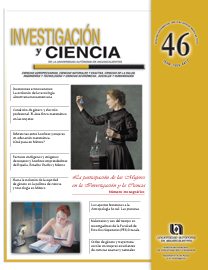Discomfort and time use in female researchers of the Faculty of Higher Education (FES) Iztacala Faculty of Higher Studies (FES) Iztacala
Keywords:
Time, Gender, Academic, Women, work, discomfort, healthAbstract
Considering that the exercise of free time is an indicator of gender inequality and taking as background studies that show differences in the use of time of men and women in different population groups, this research sought to document this disparity taking as population a small sample of university researchers, with the purpose of exploring their time distribution and its possible association with the report of physical and psychological discomfort within an academic work context. A questionnaire and an interview derived from it were applied to a non-probabilistic sample of academics from the Facultad de Estudios Superiores (FES), Iztacala of the Universidad Nacional Autónoma de México. Data are presented that show differences in hours of domestic and leisure work in women and men, and testimonies are presented to explain them; gender differences in the perception of discomfort are also discussed.
Downloads
References
ARAYA, M. J., Un acercamiento a las Encuestas sobre el Uso del Tiempo con orientación de género. CEPAL Serie Mujer y Desarrollo, no. 53, 2003.
BORELLI, A., Género y Ciudadanía: Algunas reflexiones sobre el debate en los países desarrollados. Aportes del Cuerpo de Administradores Gubernamentales. Argentina: 14, (25), 71-82, 2004.
CASTAÑEDA, Ileana, Astrain et al., Indicador sintético para medir diferencias de género, Revista Cubana de Salud Pública. Vol. 25, no.1, 54-63, 1999.
CAZÉS, Daniel. El tiempo masculino. VII Congreso de Sociología, Universidad de Salamanca. México: CEIICH, UNAM, 2001.
CRUZ, A., NORIEGA, M. y GARDUÑO, M., Trabajo remunerado, trabajo doméstico y salud. Las diferencias cualitativas y cuantitativas entre mujeres y varones. Cadernos de saúde pública. Vol. 4, no. 10, 2003.
CUENCA, Manuel., Ocio Humanista. Dimensiones y manifestaciones actuales del ocio. Bilbao: Universidad de Deusto, 2000.
DUMAZEDIER, J., Hacia una civilización del ocio. Barcelona: Estela, 1968.
GARCÍA, P., Mujeres académicas: El caso de una Universidad Estatal Mexicana. México: Plaza y Valdés, 2004.
LAGARDE, M., Universidad y democracia genérica. Claves de género para una gran alternativa, en: Daniel Cazés Menache, Eduardo Ibarra Colado y Luis Porter Galetar (coords.), Encuentro de especialistas de Educación Superior. Tomo I, México: CEIICH-UNAM, 2000.
LAGARDE, M., Los cautiverios de las mujeres: madresposas, monjas, putas, presas y locas. México: UNAM, 2003.
LEFEBVRE, Henri., La vida cotidiana en el mundo moderno. Madrid: Alianza, 1972.
McPHAIL, E., Investigación sobre tiempo libre en Occidente. Anuario de investigación 2000, Vol. I, México D.F.: UAM-X, CSH, 2001.
McPHAIL, E., Voy atropellando tiempos. Género y tiempo libre. México: Universidad Autónoma Metropolitana, 2006
MORALES, H., Entre la vida académica y la vida fa- miliar: retos y estrategias de investigadores del sur de México. Interciencia. Asociación Interciencia, Caracas, Venezuela. Vol. 32, núm. 11, 786-790, 2007.
MURILLO, S., El Tiempo de Trabajo y el Tiempo Personal: un Conflicto de Intereses. Emakunde. Vitoria-Gasteiz, España: Universidad de Salamanca, 2000.
MUNNÉ, F., Psicosociología del tiempo libre. México: Trillas, 1980.
SHAW, Susan., Gender, leisure, and constraints: towards a framework for the analysis of wonen's leisure, Journal of Leisure Research. Vol. 26, no. 1, 8-22, 1994.
TENA, O., Los malestares subjetivos de las mujeres académicas como un conflicto de deberes, en: Margarita Favela Gavia y Julio Muñoz Rubio (coords.), Jornadas Anuales de Investigación, 2005. CEIICH, México: UNAM, 2006.
Downloads
Published
How to Cite
Issue
Section
License

This work is licensed under a Creative Commons Attribution-NonCommercial-ShareAlike 4.0 International License.
Las obras publicadas en versión electrónica de la revista están bajo la licencia Creative Commons Atribución-NoComercial-CompartirIgual 4.0 Internacional (CC BY-NC-SA 4.0)





